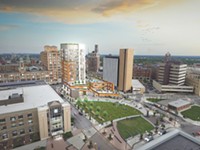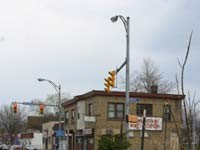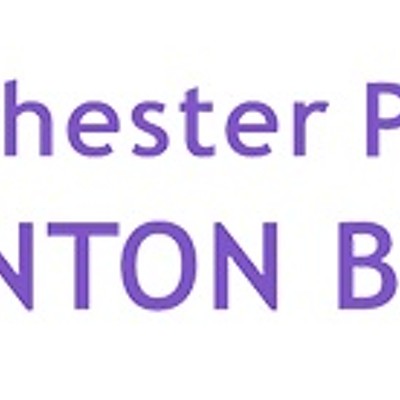[
{
"name": "500x250 Ad",
"insertPoint": "5",
"component": "15667920",
"parentWrapperClass": "",
"requiredCountToDisplay": "1"
}
]
Do they have the money?
Reporters and lawmakers have been trying to get the Rochester Rhinos to answer that question since the genesis of the PaeTec Park proposal in 2000.
The soccer team has consistently refused to say how much it has on hand to contribute to the building of its $23 million soccer stadium-in-the-works, causing skeptics to wonder whether the Rhinos will be able to cough-up their share. Those skeptics include state Assemblyman David Gantt (D-Rochester).
"I don't think the money's there," he says. "Why do they continue to put [building the stadium] off?"
The Rhinos' planned contribution to the stadium has shrunk from $26 million to about $8 million as stadium plans have been scaled back over the life of the project. According to a press release from Gov. George Pataki's office dated April 2000, the stadium was originally going to cost $44 million. The funding sources were a $15 million state grant, $26 million from the Rhinos, and $3 million from unnamed "other sources." Although the project's price tag has shrunk to $23 million, the state is still committed to its $15 million contribution.
Asked how much he has on hand right now for the stadium, Frank DuRoss, president and co-owner of the Rhinos, said "we've got enough," and declined to go into specifics. The Rhinos' share of stadium costs will come from private financing, he says, with possibly some borrowing down the line.
As it turns out, the Rhinos aren't going to need a windfall of private funds to get their stadium off the ground, thanks to a mostly sympathetic state Legislature and a little bit of help from a lot of different sources.
The state has kept its $15 million pledge to the Rhinos because many lawmakers believe in the project, says Sen. Joe Robach (R-Greece).
"It will keep [professional] soccer here, add construction jobs, and enhance that part of the city of Rochester," he says.
PaeTec Park will be built in the city's Brown Square neighborhood, a short distance from Frontier Field.
The project will create about 200 construction jobs during a 9- to 14-month construction period, DuRoss says. There will also be 40 to 60 new full-time jobs with the team and the stadium once the park is up and running. Ancillary job growth in "spin off" businesses such as restaurants that move into the area as a result of the stadium is expected, as well.
The state's share of stadium funding is coming from the Empire State Development Corporation, which reviewed partners' financial statements, assets, and cash flow before forking over the cash, DuRoss says. The corporation is a state agency that provides economic incentives to attract and maintain businesses and investments in New York State. Representatives of the corporation did not return calls for comment.
The corporation would never have agreed to fund the stadium, Robach says, if it didn't believe the Rhinos could come up with their share.
"The state money is the last piece to close the deal --- when private capital is in place and construction is ready to go," he says. "They have to be in a position where they're meeting their end of the agreement."
The $15 million will be passed through the Rochester Urban Renewal Agency on its way to the Rhinos. The agency was established in the 1960s to attempt to revitalize "blighted" areas of the city, according to Allan Richards, spokesman for state Assemblywoman Susan John (D-Rochester).
The agency also owns the land the Rhinos will lease for the stadium. DuRoss says he hopes to present a final lease agreement to City Council for its approval later this month.
The lease with the city of Rochester will likely be in the 45- to 49-year range --- the life expectancy of a new stadium --- for a "nominal" annual fee, says Mitch Rowe, assistant to the deputy mayor.
Mayor Bill Johnson says that because PaeTec Park will be a privately owned stadium, the city has not seen the Rhinos' financials.
"We're not privy to their numbers."
Not to worry, the mayor says, because the $15 million in state money is the extent of taxpayers' contribution to the project --- although the city is paying out about $3.5 million for infrastructure and road improvements related to the project.
"I can't envision any scenario where the public would ever have to subsidize PaeTec Park," Johnson says. "They're not going to be left holding the bag."
The Rhinos are getting state money up front and then "they will be responsible from that point on," Johnson says.
But the $15 million was never in question; it's the Rhinos' share that has some people on edge.
"From our end, it was never an issue," says team spokesperson Eric Trendel. "From other ends, forms of funding might have been questioned a little bit."
Indeed, Robach says the Rhinos "bit off more than they could chew" in their original plans for a $44 million stadium. If the team had insisted on sticking with those plans, it would have had to look to someplace other than the state for more money, he says. "We did what we could for this project."
Take a $23 million stadium, subtract $15 million in state funding, and that leaves the Rhinos to kick in $8 million, right? Eventually, maybe. But not right off the bat. In fact, the Rhinos' initial contribution to PaeTec Park is closer to $1.5 million, according to Richards and Rowe.
The $1.5 million, Richards says, will go to the cost of the stadium itself and toward infrastructure development, including engineering and architectural work
The reason the team can get by only chipping in $1.5 million initially is because, Richards says, it is deferring the construction of 20 planned stadium luxury boxes. The hope, Richards says, is that well-oiled investors will see how successful PaeTec Park is once it opens, and want to be part of it.
And if that doesn't happen? "That, I don't know," Richards says.
Delaying the luxury boxes is not about money, counters DuRoss, it's about getting the stadium up and running in time for next season.
"We still intend to build 20 luxury suites," he says. "It's a time issue more than anything else."
The Rhinos are also saving money by leasing the 26,000-square-foot Empire Precision Plastics building at 460 Oak Street for the team's administration building and possibly, locker rooms. The building will house team and stadium offices, a merchandise store, ticket windows, and some storage space. The building's current tenant has decided to relocate, DuRoss says.
The Rhinos, Rowe says, will enter into a 15-year lease with an option to buy with the building's owner, Maguire Properties. The team will be able to exercise that option at any point during the life of the lease. The Irondequoit-based Maguire Properties is also paying approximately $1.8 million, Rowe says, to rehabilitate the building to meet the Rhinos' needs --- another cost savings for the team.
A stadium groundbreaking could be just weeks away, DuRoss says.
"We've been pigeonholed in dates in the past. We don't want to be set in stone on a date," he says. "The goal is to break ground relatively quickly."
The timeframe is tight, DuRoss says, but the team does plan to play home games at PaeTec Park next season. Since the season starts in early May, DuRoss says the team will play on the road and possibly at Frontier until the new stadium is ready.
Mayor Johnson says he believes in the project and that all the headaches --- project delays, funding questions and/or struggles --- will be worth it.
"I believe there is a market out there," he says, adding that the stadium will generate positive cash flow for the community. "It will have a tremendously beneficial effect."
But some, including Assemblyman Gantt, say that while PaeTec Park may be a dream worth believing in, the way the deal is being put together is scary and unconvincing of the long-term viability of the stadium.
"I still say, 'Where's the money?'" he says. "You're leasing this, you're leasing that... I think it's very shaky."
Back when the price tag was $44 million, Gantt says, the state's $15 million commitment represented a small fraction of the project's cost. The state's commitment hasn't changed, Gantt says, but it is now picking up more than 60 percent of the tab.
"There's something wrong with this picture."
Speaking of PacTec Park, Rhinos
-

A major-league pipe dream?
May 18, 2005 -
Reader feedback 10.1.03
Oct 1, 2003 -
Finger-gnawing fun
Jul 2, 2003 - More »
Latest in News
More by Christine Carrie Fien
-

Building up
Mar 29, 2017 -

Hetsko's heart
Mar 15, 2017 -

Squeezing starts at GateHouse-owned Daily Record and RBJ
Feb 28, 2017 - More »
More by Christine Carrie Fien (FORMER)
-

Sticking it to the 19th Ward
Apr 21, 2004 -
After Amo
Apr 14, 2004 -
Of bonds, bridges, and bravado
Apr 14, 2004 - More »






